Vorlage:In the news: Unterschied zwischen den Versionen
Sarah (Diskussion | Beiträge) Keine Bearbeitungszusammenfassung |
Sarah (Diskussion | Beiträge) Keine Bearbeitungszusammenfassung |
||
| Zeile 18: | Zeile 18: | ||
Arthur Junghans had an enduring influence on the relationship between [[Uhrenfabrik Junghans GmbH & Co. KG/en|Uhrenfabrik Junghans]] and the automobile. Having ordered one of the first Daimler test vehicles in [[1892/en|1892]], [[1895/en|1895]] saw the son of company founder Erhard Junghans acquire a second automobile: a four-seater Motor-Viktoriawagen. To enable the use of a steering wheel in the car the Schramberg businessman had to produce the worm gear steering himself. At the beginning of the 20th century the first laws were passed regulating speed in built-up areas, increasing the significance of clocks in automobiles. As a consequence in [[1908/en|1908]] Junghans produced its first car clocks. These not only aided the time orientation of the driver, they were also a form of tachometer: using the time taken to travel a known distance it was possible to determine the speed at which it was covered – making the car clock a key instrument for drivers. | Arthur Junghans had an enduring influence on the relationship between [[Uhrenfabrik Junghans GmbH & Co. KG/en|Uhrenfabrik Junghans]] and the automobile. Having ordered one of the first Daimler test vehicles in [[1892/en|1892]], [[1895/en|1895]] saw the son of company founder Erhard Junghans acquire a second automobile: a four-seater Motor-Viktoriawagen. To enable the use of a steering wheel in the car the Schramberg businessman had to produce the worm gear steering himself. At the beginning of the 20th century the first laws were passed regulating speed in built-up areas, increasing the significance of clocks in automobiles. As a consequence in [[1908/en|1908]] Junghans produced its first car clocks. These not only aided the time orientation of the driver, they were also a form of tachometer: using the time taken to travel a known distance it was possible to determine the speed at which it was covered – making the car clock a key instrument for drivers. | ||
[[Junghans Meister Driver Chronoscope: An expression of pure passion|>>> | [[Junghans Meister Driver Chronoscope: An expression of pure passion|>>> more >>>]] | ||
<br style="clear:both;" > | <br style="clear:both;" > | ||
Version vom 17. März 2016, 10:52 Uhr
| IN THE NEWS | ||
|---|---|---|
| News archive 2025 << News archive 2026 >> All news | ||
Meister Driver Chronoscope: An expression of pure passion 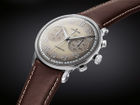 Schramberg / Basel, March 2016 Junghans and cars enjoy a close connection dating back over 100 years. Inspired by this, the Meister Driver Chronoscope combines the charm of classic cars with a passion for mechanical timepieces. Time travel
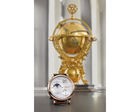 Glashütte, March 2016 At the annual press conference of the Staatliche Kunstsammlungen Dresden (SKD) on 9 March in Dresden, SKD director Hartwig Fischer and Lange CEO Wilhelm Schmid announced the continuation of their partnership, which began in 2006, for another five years. The cultural partnership between the traditional watchmaker and the worldfamous museum association experienced another highlight last year in the form of the special exhibition “Simple and perfect – Saxony’s path into the world of international watchmaking”, which marked 200 years since Ferdinand Adolph Lange’s birth. The SKD’s 14 museums, including the Grünes Gewölbe (green vault), the Galerien Alte und Neue Meister (old and new masters’ galleries), the Porzellansammlung (porcelain collection) and the Mathematisch-Physikalische Salon, are some ...
 Glashütte, February 2016 World time masterpiece from Glashütte Original wins coveted prize Honouring exceptional timepieces, newcomers and beloved classics alike, the “Golden Balance” is one of the most coveted awards in the watch industry. Glashütte Original's Senator Cosmopolite was awarded first prize in the premier category, “Watches over 25,000 Euros”, at a festive ceremony held last Thursday, February 25, 2016. The “Golden Balance” was awarded for the 18th time this year. A total of 354 different models
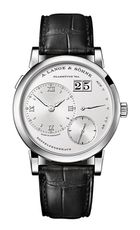 The new LANGE 1 in white gold is just around the corner Glashütte, February 2016 The LANGE 1 owes its recognition to the asymmetric dial design and the prominent Lange outsize date. It was inspired by the five-minute clock in the Dresden Semper Opera House, which, for 175 years, has been a hallmark of the world-famous operatic venue. Some ideas are so persuasive that they can survive catastrophes and retain their fascination even 175 years after they premiered. One of them is the five-minute clock in the Semper Opera House that displays the time digitally. Aloft over the stage, it indicates the time in an artistically framed double aperture: the hours in Roman numerals on the left, the minutes – in intervals of five – in Arabic numerals on the right. Every evening, the operagoers wait patiently for the minute display to switch from 55 to the blank white field, because the performances always begin at the top of the hour. When the Royal Court Theatre was inaugurated in 1841, this technical marvel was considered a sensation, and, for its inventor, Johann Christian Friedrich Gutkaes, it resulted in his appointment to court clockmaker. Together with his employee Ferdinand Adolph Lange, Gutkaes completed the exceptionally large tower clockwork with two counter-rotating wheels and ...
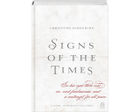 Author: Christoph Scheuring Glashütte, January 2016 A literary monument to Ferdinand Adolph Lange Christoph Scheuring’s historic novel entitled “Signs the times” was inspired by the fascinating personality of Saxony’s watchmaking pioneer. Ferdinand Adolph Lange was born in Dresden just over 200 years ago. Much has already been written about his accomplishments – the establishment of the precision watchmaking industry in Saxony and his determination to craft the world’s finest timepieces in the Ore Mountains. But little has been known about the first few years of his life so far. His rough-hewn father was a gunsmith who left the family early on. Lange grew up with foster parents who encouraged him in his ambitions and allowed him to study at the newly founded Royal Technical College ...
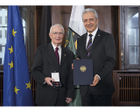 Glashütte, November 2015 The founder of Lange Uhren GmbH, Walter Lange, has been awarded the Order of Merit of the Federal Republic of Germany (First Class) by German President Joachim Gauck in recognition of his services to re-establishing Saxony’s watchmaking industry. The award was presented by Stanislaw Tillich, MinisterPresident of the Free State of Saxony, on 25 November at Saxony’s State Chancellery in Dresden. In his laudatory speech, the Minister-President of Saxony described Walter Lange as an entrepreneur who had shown extraordinary commitment to ensuring that German precision watchmaking found a new home in Glashütte. Thanks to his outstanding contribution, the town ...
| ||